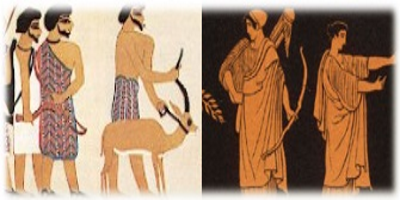Philosophy, the study of knowledge, and linguistics, the study of language, are two very different branches of science, but they do have overlapping components. I am not a philosopher, but as a Hebrew linguist, I have discovered that there is a strong connection between language and the philosophy of those who speak that language.
In this world there are two major branches of philosophy, Eastern and Western, but for the purpose of this article and for reasons that will be clear shortly, I am calling these two branches of philosophy “simple” and “complex.” The difference between these two is that “simple philosophy” studies and investigates the “known” world and “complex philosophy” studies and investigates the “unknown world.” One that lives with a “simple” philosophy looks at an ocean and sees an endless expanse of water, but one who lives with a “complex” philosophy, looks at the same ocean and wonders what lies beyond the water. Every culture around the world falls within a spectrum of these two philosophies. Very simple cultures will see the ocean as a barrier and never attempt to investigate it. On the other end of the spectrum, a very complex culture will spend an exorbitant amount of time, energy and resources in an attempt answer the question about what is on the other side of the water.
Have you ever wondered why the natives in America, who had just as much time and resources as Europeans at their disposal, were building small boats with stone axes, while the culture from which Christopher Columbus came from, were building large sea-going vessels made with large timbers, iron and massive sails? When Christopher Columbus arrived in the Americas he came from a culture with a very complex philosophy and he discovered a culture with a very simple philosophy.

Native American Boat

European Ship
There are very few cultures today with a very simple philosophy, but they can be found deep in the jungles of the Amazon and Africa or on isolated islands, such as the North Sentinel Island off the coast of India, which has recently been in the news when these isolated peoples of the island killed a young missionary attempting to make contact with them. Besides these rare and isolated cultures, the remaining world has a more complex form of philosophy, some more complex than others. But it has not always been like this.
My theory is that “simple” philosophy is a natural form of philosophy that all people are born with. The more “complex” form of philosophy can only be learned. For the vast majority of the history of the world, all cultures followed this simpler form of philosophy and it was not until the Greeks came along and began to formulate more complex forms of philosophy. Only through this more complex form of philosophy can the sciences be developed. A simple form of philosophy will look at a rock and ask, “What can I do with this rock.” But a complex form of philosophy will ask, “What happens if I melt this rock and combine it with this rock?”

Stone Age Tools

Iron Age Tools
What I find most interesting is that whenever a culture with a more complex philosophy meets a culture with a simpler philosophy, the more complex culture will always dominate and eventually erase the simpler philosophy of that culture. We see this throughout history, such as when the Jews were dominated by the Greek and Roman culture, resulting in much of their philosophy being influenced by them. When the Romans invaded northern Europe, they replaced the simple philosophy of those cultures with their more complex philosophy. When the Europeans came to America, we see this same invasion of philosophy. Eventually, at some point in the future, all of the remaining isolated and uncontacted peoples around the world will eventually be dominated by our modern complex philosophical world, completely erasing any trace of the more natural simple philosophy that we are all born with.

Modern Stone Age People

Modern Western People
So, you might ask, “What does all of this have to do with the Hebrew language and the Bible?” The Hebrew Bible was written in a culture that had a very simple form of philosophy and in order to properly interpret the Bible we must do so from a very simple form of philosophy. However, if we assume a more complex form of philosophy onto the text, we will come away with an interpretation that was not intended by the author.
In my research into primitive peoples, I have found that the modern Stone Age peoples that still exist in small pockets, which have been contacted by Westerners, have a form of philosophy that is very similar to the Ancient Hebrews of the Bible. For instance, in the Ancient Hebrew language there are two words for “south.” The first is yamin, which means “to the right,” which is south when facing the rising sun (while we orient our compass directions to the north, the Hebrews oriented their compass directions to the east). The other is negev, which means “desert” and the Negev is the name of the southern desert of Israel. Similarly, in the primitive Piraha tribe of the Amazon, linguists found that their directions were identified as “toward the river,” “toward the middle of the jungle” or other similar absolute direction.
In the Piraha language, they refer to themselves as the “straight ones” and outsiders are called the “crooked ones.” These same concrete expressions can be found in the Hebrew language as well, but they are translated out by the translators by replacing these concrete terms with more abstract ones that our culture is more familiar with. The King James translation of Proverbs 14:2 reads, “ He that walketh in his uprightness feareth the LORD: but he that is perverse in his ways despiseth him.” However, when we translate this literally from the Hebrew it reads, "One who makes his walk straight will revere Yahweh, but the one who makes his path crooked is worthless." I am of the opinion that through study of the culture, lifestyle and language of people who live a simpler philosophy, we can better understand the Ancient Hebrews. Besides the uncontacted peoples of the jungles, we can also study the modern-day Bedouin who live a lifestyle very similar to that of Abraham over 3,000 years ago.
I was always puzzled by the Hebrew word אָהֳלֹה (ahaloh), which did not conform to standard Hebrew morphology. In Genesis 9:21 this word is usually translated as “his tent,” but in Hebrew, “his tent,” is written as אָהֳלוֹ (ahalo), such as we can see in Genesis 31:25. Donald P. Cole spent a year living with the Bedouin and documented his research into their culture with his book Nomads of the Nomads. While reading his book I discovered that the tents of the Bedouin were not the property of the men, but instead the wives. In their culture, it is not “his tent,” it is “her tent.” Assuming this is not only true for the modern-day nomads, but also the Hebrew nomads of the Bible, it would explain the spelling of אָהֳלֹה (ahaloh). The vowel pointings, which are the dots and dashes above and below the Hebrew letters, were invented only 1,000 years ago. So, if we remove these vowel pointings we have the word אהלה (ahalah), which means “her tent.” Noah was not sleeping off his drunken stupor in “his tent,” because he did not own a tent. He was sleeping in “her tent,” the tent owned by his wife. Genesis 24:67 reads, “And Isaac brought her into his mother Sarah's tent…” It has been assumed by many, based on this passage, that Sarah had her own tent, apart from Abraham’s. However, now we know, based on what we have learned from the Bedouin culture, that Abraham did not have a tent, only his wife Sarah did.

This picture is an artist’s interpretation of what scientists believe our Milky Way Galaxy looks like. While some may think that this image of our Galaxy is fact, in reality it is nothing more than an educated guess, as we have never seen our Galaxy from the outside. But this is a good example of how our modern complex philosophy deals with the unknown; we make assumptions, hypothesis and theories and then turn them into fact, thereby making the unknown, known. Did the Ancient Hebrews conceive of us living on a planet inside the Milky Way Galaxy filled with billions of giant balls of burning gas? Of course not, but still, when we read about the stars in the Bible, we assume this cosmological understanding.
When you are reading the Bible, it is imperative that you leave behind your complex philosophy and adopt a much simpler philosophy. Unfortunately, much of our modern theology is based on our western complex philosophy. Concepts such as God, heaven and hell have been tainted by this complex philosophy. As an example, if you read the theology about “hell,” you will find volumes of works on the subject detailing where it is, who goes there, when and how it came about, etc. But all of this is extra-Biblical philosophy does not exist in the Bible or in the minds of the Ancient Hebrews who wrote it. In fact, the Hebrew word that is translated as “hell” is she’ol, which is derived from a root meaning “something that is not known.” To the Ancient Hebrews, she’ol is “the unknown place,” but modern western philosophy is not comfortable with leaving something “unknown,” which is why we have to develop all of these theologies in order to make something that is unknown, known.

Like what you’re discovering? Continue the journey from Bible reader to translator.
|






